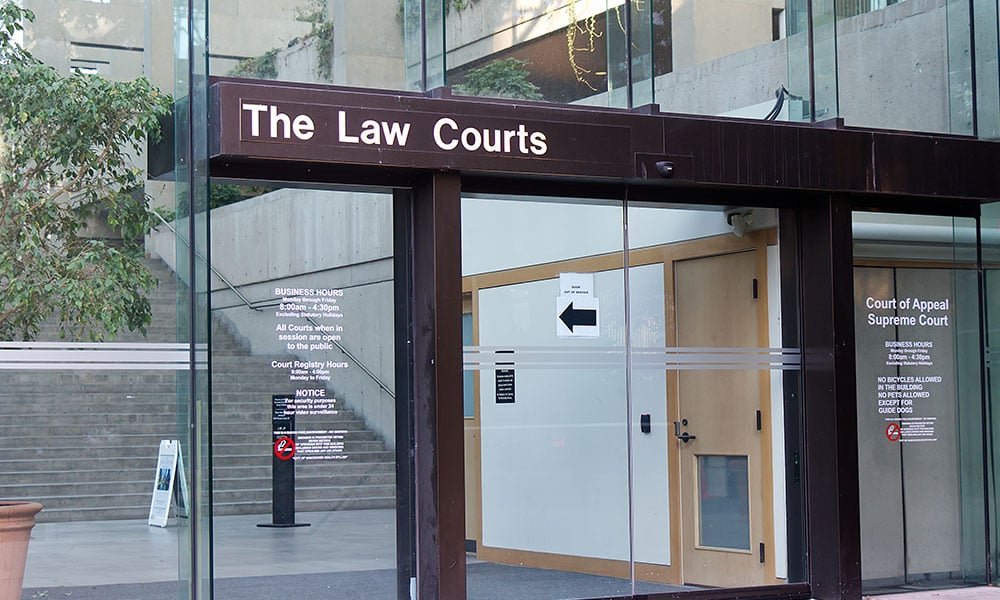Court found tribunal downplayed seriousness of the $26,000 claim

The Court of Appeal for British Columbia has quashed a decision from the Civil Resolution Tribunal which concerned the section of the Civil Resolution Tribunal Act that limits the role of lawyers in proceedings, sending the matter back to the tribunal.
In The Owners, Strata Plan NW 2575 v. Booth, 2020 BCCA 153, the owner of a strata unit sued the strata corporation for $26,000. The respondent, Strata Plan, requested that they be represented by a lawyer before the tribunal.
There is only a limited role for lawyers in the Civil Resolution Tribunal, and their participation requires the tribunal’s permission. The CRT denied the Strata Corporation’s request to have legal counsel. Strata Plan then sought judicial review of the Tribunal’s decision and the petition was dismissed. Strata Plan appealed.
Justices Mary Saunders, Mary Newbury and Gail Dickson of the B.C. Court of Appeal allowed the appeal, finding the scale and basis of the claim exceeded the representation of the dispute made by the tribunal. While the tribunal had found “nothing exceptionally unusual or complex about the subject‑matter of the dispute,” the Justices countered that the claim raised the issues of tort, vicarious liability, reputation and jurisdiction.
The types of claims over which the CRT has jurisdiction are those which are “amenable to speedy and economical resolution.” Section 20(1) of the Civil Resolution Tribunal Act limits the role of lawyers, stating, “Unless otherwise provided under this Act, the parties are to represent themselves in a tribunal proceeding.” A party may have a lawyer if they are a child, with impaired capacity, the rules permit it or “the tribunal, in the interests of justice and fairness, permits the party to be represented,” states the Act.
Verna and George Booth made a claim against their condo, Strata Plan NW 2575, amounting $26,000, in June 2017. The claim included $700 for patio repairs, $300 for costs incurred in the dispute and another $25,000 for “loss of enjoyment of life, threats, abuse and stress,” said the decision. The Booths alleged Strata Plan failed to act in good faith and had been dishonest and oppressive. The couple also said they were victims of physical, emotional abuse and threats, about which they twice had to call the police for protection.
Strata Plan has directors’ and officers’ liability insurance for defence coverage and under their policy retained counsel in the Tribunal. Strata Plan filed a representation request, which was denied. The Tribunal gave as reasons: “the owners do not agree to the representation,” the owner’s saying that if the Strata were represented by a lawyer it would “tip the scales of justice against [them];” “the owners are not represented;” and “there is nothing exceptionally unusual or complex about the subject-matter of the dispute.”
The Tribunal added under the act it had “residual discretion” which should only be exercised in exceptional circumstances otherwise the Tribunal may exceed its authority and subvert the will of the legislature. The Tribunal also states parties had the right to use a “helper” and the strata could get legal advice, assistance preparing submissions and documents and organizing evidence.
On the petition for judicial review, Justice Nathan Smith of the B.C. Supreme Court agreed that the dispute was more severe than the cost of the patio and that it is “particularly important” that petitioners have legal counsel when defending themselves against claims of dishonesty, fraud and bad faith. Though Smith added that “the fact the petitioner may need assistance of counsel does not necessarily translate into a need for counsel’s direct participation.” Smith applied Dunsmuir v. New Brunswick, 2008 SCC 9, and said the question before him was “whether the decision fell within a range of possible, acceptable outcomes which are defensible in respect of the facts and law.” He found the decision did.
On appeal, Strata Plan argued the petition judge erred in “failing to consider the seriousness of the Tribunal’s misapprehension of the nature of the dispute and its material effect on the decision to deny legal representation.”
The Court of Appeal granted the first ground of appeal, stating the “vast majority” of the Booths’ claim came from damages for alleged threats, abuse and “loss of enjoyment of life.”
“It is clear to me that the scale and basis of the claim take it beyond the mere repairs referred to by the Tribunal, into a more complex zone of legal issues,” wrote Saunders.
In between the judicial review application and the appeal, the Supreme Court of Canada re-stated the common law standard of review in Canada (Minister of Citizenship and Immigration) v. Vavilov, 2019 SCC 65.
“In Vavilov, the majority explained that failure of the decision maker to account meaningfully, in the reasons provided, for central issues or concerns of the parties (or evidence) may be shortcomings that will fatally undermine the reasonableness of the decision,” wrote Saunders.
Because the tribunal referred to the claim as concerning “the maintenance of a sunroom,” and calling it a “common” and “typical” dispute, it failed to account for the “complexity inherent to the claim itself,” rendering its decision unreasonable, the court found.









